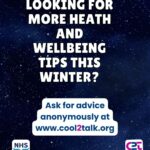Keeping You Safe
cool2talk provides a safe space for you, but we do have to make sure you are safe, if we think you are in immediate danger. This section explains what that means.
Confidentiality & cool2talk
cool2talk provides a confidential service. When you use the site you do not have to provide personal information that identifies you.
Sometimes, if we’re worried about your or someone else’s immediate safety, we may need to get you help. If this is the case, we will use your IP address (a number used by your internet provider)and other information that you have provided to get help to you.
We would like to reassure you that this would only happen if there was immediate risk of harm for you or someone else.
Please post a question on the site if you want more information
What do we mean by child protection?
All children and young people have the right to be protected and kept safe from harm. Sometimes, children and young people are harmed by adults or other young people who they know and trust. Sometimes, but much more rarely, children and young people can be harmed by strangers. All adults have a responsibility to help protect children and young people. When we talk about something being a child protection issue, we mean that we have information that makes us think the child or young person is at risk and that it is necessary to help them. When we talk about being at risk it means from physical or sexual abuse or anything that puts a young person or child in danger.
Confidentiality
When a young person speaks to someone in the health service that consultation is confidential; that means that no one else can be told without that child or young person’s permission. This includes parents and carers. This changes if the child or young person tells someone that they, another child or young person are being abused in any way. Information may also be shared in some cases where a child or young person is an immediate risk to themselves. In Tayside professionals must pass that information on so the situation can be investigated and the child or young person can get the help they need.
What happens next?
When services are notified about a child protection situation there is usually an investigation by police and social work. The police officer and social worker will come and talk to the child or young person and anyone else who may be involved. The police and social workers who do this work are specially trained for this work and are there to help. They are not in uniform. They will interview the young person in the best place for that young person. The young person can have a trusted adult with them.
Every case is different
The situation will be risk assessed this means that police and social work will decide if there is an immediate risk to the child or young person and other members of the family. Everything is done to protect the child and young person and to work with families so they can stay together and be safer. Depending on the outcome of the assessment a decision will be made about how best to help the child or young person. The adults working with the child or young person have a duty to keep them informed and explain about any further meetings.
Medical Examination
In rare cases part of the investigation may be a medical examination. If this happens the child or young person has the right to refuse having a medical examination.
Who to talk to
Remember that if a child or young person is being abused in any way, or is at risk from harm, it is not their fault. There are services out there to protect all children and young people. If a child or young person is worried they should talk to a trusted adult; this might be a school nurse, a teacher, GP, a youth worker or local young people’s service. They all help children and young people get the support they need locally.
Other useful numbers and websites
Child line: 0800 1111 (http://www.childline.org.uk)
https://ceop.police.uk/Safety-Centre/
Get help and protect children from abuse – Child Protection Scotland

